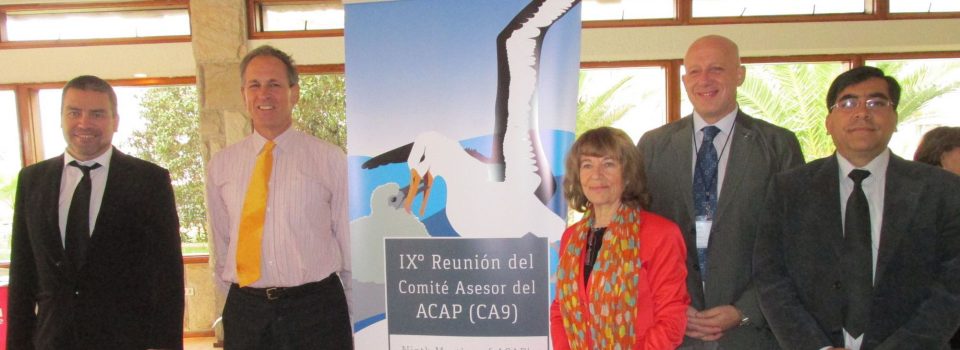Chile is the host of the ninth meeting of ACAP
June 16th, 2016
During the meeting, Chile will present advances in the protection of these birds in our country.
Between May 2 and 13, 9th international meeting for Agreement on the Conservation of Albatrosses and Petrels (ACAP) was held, this was organized by Subsecretaría de Pesca y Acuicultura and Instituto de Fomento Pesquero, under the agreement ratified by Chile in 2004.
Undersecretary of Fisheries and Aquaculture, Raul Súnico said: “It is an honor for us and a great responsibility to organize this event, which confirms the commitment of our country to reduce the death of these birds in by-catch fishing activities.”
With regard to the progress of our country in implementing National Action Plan to Reduce Bycatch of Birds in Longline Fisheries, Súnico said: “We have made progress in the implementation of good practices, such as the obligated requirement for ships to use devices or utensils, in order to minimize the incidental catch and release trapped specimens. This has given us important achievements as reverse the decline in some colonies of albatrosses and the inclusion of the shearwater as one of the species that are in the list of ACAP, which gives her an extra international protection.”
Fisheries Evaluation Department Head of IFOP, Dr. Carlos Montenegro Silva, explained the role of the institute in this area: “IFOP advises directly Subsecretaría de Pesca y Acuicultura, providing input information to develop the national annual report. In addition, it is responsible for monitoring the National Action Plan (PAN-AM) and maintains a continuous monitoring of this subject through the monitoring programs of the Main National Fisheries.”
“IFOP actively participates in ACAP, with MS. Jorge Azócar, a researcher of Fisheries Division, who is member of the Bycatch Working Group (BCWG), and together with the focal point of Chile, they articulate the work plan in order to provide effective responses to ACAP. He will be the head of delegation during the meetings of the working groups. We also have a permanent representative on the Secondary Bycatch Working Group, direct advisor during the development of the Advisory Committee meeting,” concluded the professional of IFOP.
Dr. Anton Wolfaardt, President of the Bycatch Working Group explained: “We have a large number of documents to review, which represents the large amount of work that has been carried out by different areas. My hope is that we will have productive discussions on all these issues and also update our recommendations for the assessment, mitigation, management and monitoring of the incidental catch of these seabirds.”
The meetings of the two working groups: population and conservation status, and bycatch are carried out every 18 months and show the progress of the working plan and the pertinent research for seabird conservation. Subsequently, its recommendations and reports are informed at the meeting of the Advisory Committee (CA9), who in consideration of scientific antecedents, performs a prioritization process and then a Work Plan is generated, with different activities involved.
This is the second time that this event takes place in Chile, the first corresponds to 3rd Advisory Committee Meeting, which was held in Valdivia in 2007.
The Agreement for the Conservation of Albatrosses and Petrels, also known by its acronym ACAP, is a binding multilateral agreement that seeks to preserve the population of albatrosses and petrels through coordinated actions to mitigate the threats to these populations. The same became into effect in February 2004; currently, it has 13 participating states and covers 29 species of albatrosses and petrels.
